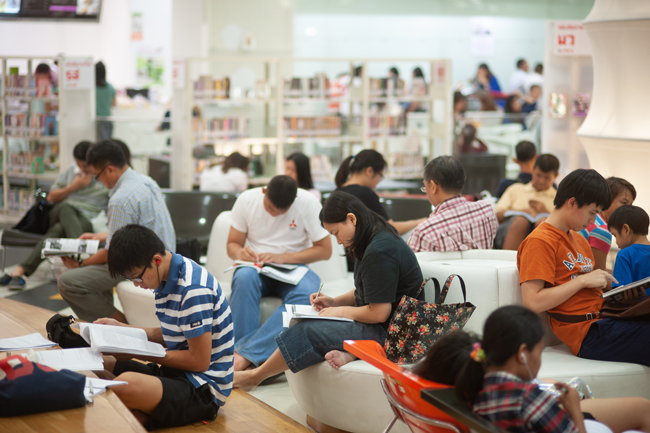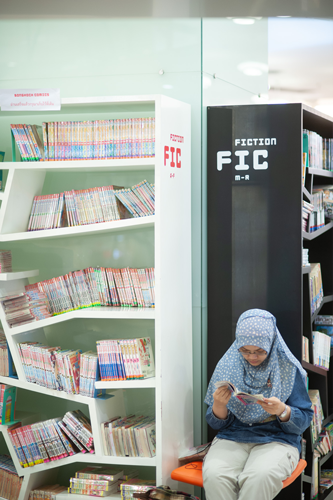The word "reading," unless accompanied by context that clearly specifies its meaning, has a way of conjuring an idea that is a myth, especially when the word is used in connection with the word "society."
"Reading" tends to be automatically associated with literature, perhaps because the activity so called had a vertical start (moving from high to low), that is, it filtered from the upper class down to the middle class when printing became widespread and books became more affordable. Books were once regarded as sacred objects (because the first iterations of them were books of scripture or were exclusively properties of those in high places), but their status changed when they turned into sources of entertainment for the well-to-do. During a period in history, people who read were criticized for indulging in nonsense and fantasy, as people in modern times now are when they watch television or play video games. Later, as writers came to occupy the status of public intellectuals, reading became viewed as an activity that sharpened the mind, something "high-caliber people" ought to be in the habit of doing. Being a reader conveyed the sense someone was intelligent, that they knew and understood the world better than somebody else who wasn't a reader. This myth about, and discourse around, reading persists to this day.
That being the case, when the word "reading" comes up, what is meant does not cover the reading of just anything but specifically of books deemed worthwhile. If a person reads daily or reads all the time, but what they read are manga or lifestyle magazines or, even in this day and age, if they read on social media, their activity doesn't count as "true" reading, no matter that the substance contained in those sources may be no less edifying than what can be found in "proper books."
With "reading" defined in this way, in a country where buyers of books, especially works of literature, remain primarily the educated and the middle class and up, reading will, of course, appear to be losing popularity as we live in an era where the internet is where most people go to disseminate and receive information, the practice having quickly taken over as mainstream ever since people in almost every socioeconomic class have had easy access to the internet. Although a vast store of "books" exists online and there are plenty of websites that, no different from printed tomes, showcase different types of literature, be it novels, short stories, or poetry, reading on the internet remains stigmatized as a less serious endeavor than reading physical books, especially printed works of literature.

The stereotype commonly held among Thais is that ours is not a society where people like to read. The number of bookshops and presses that we have, however—which can't be characterized as low for a country where most of the population still lives in poverty and books are considered an extravagance—would seem to counter this view. In times before there were as many shopping malls as there are now, almost every market in the country had stalls selling newspapers, magazines, comic books and romance novels. Later, as more players entered the publishing industry and the country's economy grew, standalone bookshops proliferated. Most of these were owned by companies which also ran presses or printing houses, Amarin Printing and Publishing's Naiin shops and SE-Education's SE-ED stores being a couple of examples. Whatever the case, the number of bookstores and titles published annually in Thailand do not support the broadly held view that Thai people do not read very much.
Since the beginning of the twenty-first century, the rise of the internet has posed serious threat to the publishing industry, especially after smartphones became cheaper and their use widespread among people in every socioeconomic class. It is not that people are spending more time reading online instead, but the internet has syphoned their free time away from activities once favored in the past. Reading isn't alone affected: the internet has made people go to the movies less, watch less TV; they even go shopping in a mall less now that online shopping has become faster, safer and more convenient (though in Thailand malls have remained relatively unscathed because going to the mall to socialize or have a meal remains a popular leisure activity). The same phenomenon is happening around the world, with the effect that many bookstores have had to close, especially chain stores, which used to thrive in the past.

The internet's disruption of the publishing industry has created a number of effects worthy of note and study. One thing observable in its wake is what is called "literature" has been little affected: the readership bases of literature considered "serious" or to be of artistic value and of different kinds of popular fiction have not meaningfully been eroded. In almost no country did "serious" literature enjoy broad readership to begin with. Once every so often, a special case will come along, where, for example, a big prize will boost a book's sales, or word of mouth will propel a title to bestseller status. These special cases aside, the number of readers for a "serious" work of literature generally does not touch five figures. Even writers well-known in that sphere generate sales only in the low tens of thousands of copies for their books (which already amount to "strong sales"), meaning that an average print-run for a title of "serious" literature is only in the thousands of copies (emerging or unknown writers might even start off with printings in the hundreds of copies), even though works of this kind are supposedly what people should read and are what is generally implied when one talks about "reading."
In reality, reading "serious" literature, literature that is art, or classic literature has always only been a pursuit for a limited group of people, though canons have been passed down from generation to generation through school curricula, cultural institutions and the self-perpetuating power of their myth (that such and such a book is "profound" or "great" or "exemplary," etc.), and it has always largely been the educated, not people in society at large, who place weight on cultural history and value the minds of artists. That does not mean people in the broader society do not read, but most read according to the popular tastes of the time, more so than they read with the aim to consume high art. In Thailand, this tendency has translated to romance novels' enjoying perennial demand, even if the plots or themes in fashion will vary from period to period.
Melodramatic romances involving family conflicts are a genre of fiction that has enjoyed longstanding success in Thailand. They saw their heyday during an era when magazines—those usually branded as "women's magazines" or "housewives' magazines"—provided a platform for this kind of work. These novels were serialized and often had their television rights picked up and were made into TV shows afterward. Fiction of this genre attracted a large base of devoted readers, who would eagerly await the release of each issue of the magazines, which typically published on a twice-a-month cycle or even more frequent. This means quite a few Thais were "readers," and that's without taking into account the fact that the popularity of these works did not wane when they were collected and published as books or after they were made into television series. In Thailand, of those who might be called "professional literary writers," the ones who manage to achieve both fame and fortune seem invariably to work within this genre.
That said, the disruption brought on by the internet has not spared such romances published in the old format. Many magazines have had to shutter or to adjust to the times by moving online, but their readerships have plummeted such that the figures don't compare to what they used to be during the golden era of these works. The kind of genre fiction that sells well these days has turned out to be novels geared toward readers in their late teens and early twenties, in particular yaoi novels (commonly referred to as "Y novels" in Thailand), which are homoerotic narratives featuring male protagonists, but are mostly written and read by women. This phenomenon reflects the fact that in Thailand readers and novelists are—and have for a long time been—mostly women (of various ages). On the other hand, when it comes to other types of reading materials such as manga, newspapers, business books and sports books, the readership tends to be male. Therefore, when one talks about "reading" as the term is understood under the existing myth, in Thai society, women make up a larger percentage of readers than men do.

If assessed based on their degree of internet use and the frequency with which they share different types of messages on social media and through communication applications, people in Thai society undeniably read a lot and on a regular basis. Many of the writers who have their own "pages" or websites and regularly engage with readers online command huge followings (undoubtedly bigger than the number of purchasers of their books). But when "reading" is defined to exclude all instances not involving printed books or serious literature, one would be hard pressed to say that Thais have made strides in their reading habits. What one might be able to say, broadly, is that the number of readers of serious literature has remained stable as compared to the past (that is, when books became relatively affordable at the start of the twentieth century): there is a turnover of readers, rather than growth in the reading culture. People who read a lot as teenagers and young adults have their attention diverted from the activity as they move to the next stages of life and are burdened by a growing number of responsibilities, and a new generation of readers takes their place. The readership for other types of writing, however, depends more on trends and word of mouth.
All in all, the probable reading habits of Thais might be summarized as follows: first, Thai people "read" more and more frequently than is believed, but because what they read is not classified as literature or works of high status, their reading activity is overlooked as "reading;" and second, in Thailand, avid buyers and readers of books are people in the middle class and higher, and there is a turnover of these readers.
Even among the middle class, however, books are seen as overpriced goods, as extravagant purchases (though people don't hesitate to shell out for a night of going out or for lottery tickets, even if the bill might easily rival the cost of a book). Many Thais have no understanding of the system of book production or the costs involved in writing and publishing a book, and are of the view that books ought to be extremely cheap (they only look at the material, and on that level, books are only paper after all). Moreover, Thailand does not have a reading culture where people are in the habit of making reading a part of their everyday life, such as by reading before bed, reading while commuting on public transportation, or bringing a book along to read on vacation or to read as a way to spend waiting time, as might be commonly done in some cultures like Japan or in Europe. One can't say, therefore, that Thailand has a strong reading culture or one that has shown development over time, despite the fact that quite an extensive publishing industry exists in the country and many presses and printing houses generate quite heathy profits.
Instead of clinging to the myth of what it means to read, Thailand as a society perhaps ought to expand the understanding of the word to reflect the times we are living in and the reality of how people behave. The strength of a given society's reading culture comes not from the size of its publishing industry, the amount of writers it can boast, or the number of titles that sell well in the local market, but from its people's motivation to read, from their desire to always read, to read in order to learn, to reflect, to reappraise, to imagine, to examine oneself, to understand others, to raise questions about the thoughts and beliefs of fellow mankind, to find inspiration for living life.
Unless people believe reading has the power to affect their lives and influence their points of view, books really will be nothing but overpriced items like many already think they are.
Translated from the Thai by Mui Poopoksakul
Prabda Yoon
Prabda Yoon is one of the most influential authors and filmmakers in Thailand. Prabda is best known for Kwam Na Ja Pen (The Sad Part Was), the first Thai literature to be translated and published in the U.K. His works have also been published in Japan, recently in Genron, a Japanese literary review magazine. He won the Fukuoka Arts and Cultural Prize 2021.






